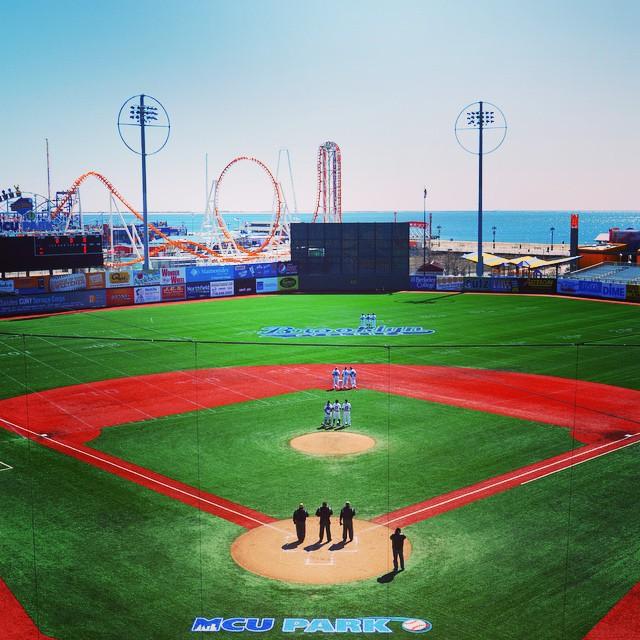Going the Distance: Baseball’s Commute to Coney Island Places Strain on Student-Athletes
The distance between campus and NYU Baseball’s home field, MCU Park in Coney Island has proven to be a difficult factor to overcome for the team to manage.
April 26, 2016
For freshman Eli Edwards, balancing NYU’s rigorous academic schedule with his love for baseball is always a challenge. However, the difficulties are magnified when the logistics of traveling from Point A to Point B are taken into consideration. Frequently a bus or train ride away from his second job as a pitcher for the NYU baseball team, everything is a trip.
“I have to schedule all of my classes before 12 because our games usually start at one,” Edwards said. “It is really hard sometimes.”
Located in the middle of Manhattan, NYU’s athletic programs are constantly plagued by a lack of nearby real estate for practice and competition, and the team’s recently revived baseball team is a shining example of these difficulties. After being absorbed last year as a part of NYU’s deal to take over Polytechnic University in Brooklyn, the team found its home at the Brooklyn Cyclones’ MCU Park in Coney Island, approximately 14 miles southeast of Washington Square Park
On a good day, a subway ride to the home of the New York Mets’ single-A affiliate for practice or a game takes about 60 minutes, and around 40 minutes via car. Edwards takes a team bus, and says it regularly takes about an hour each way.
“Right now the commuting on a bus to Coney Island is pretty annoying,” Edwards said. “But honestly our whole team has gotten used to it.”
This reluctant acceptance appears to be common among the university’s student athletes. The recent closure of the Coles Sports and Recreation Center has only further exacerbated the situation, putting the basketball and volleyball programs in a state of logistical limbo — both of those teams now practice and compete in Brooklyn.
Edwards, currently a relief pitcher for the Violets, has had to deal with going from having a field just a few steps away from class at Campbell Hall High School in Los Angeles to having to schedule his classes around his estimated commute. Before the season started, the situation was even worse. Due to the lack of fields in the city, Edwards and his team were forced to travel to New Jersey for night practices at the Professional Baseball Instruction center in Upper Saddle River, about an hour’s drive. Frequently returning deep into the night, he admits the strain was beginning to wear on him.
“We had practices that ended at 1 a.m. in New Jersey, and I got back at 2 a.m., then [have] to go to class at 8,” he said.
Though the regular season allows him to have a semblance of normalcy in his schedule, Edwards doesn’t have the routine of the normal NYU student. Thankfully, he was able to set himself up with a doable day-to-day plan, but it means early mornings and the occasional late night. Edwards is up early on Tuesdays and Thursdays for classes, but gets a bit of relief on Mondays and Wednesdays, where an extra hour of sleep allows him to arrive for his 9:30 a.m. class with a bit more energy. Even with the workable schedule though, games that start at 1 p.m. on weekdays require Edwards to rush over to the field, just in time to get warmed up. If it’s not game day, Edwards has to take advantage of his relatively small timeframe to tend to his schoolwork.
“I get back around 5 p.m. or 6 p.m. if I don’t have a game, which makes me do homework right after,” he said about his practice schedule. “But it hasn’t made me stay up that late now.”
Couple his school and sport schedule with his extracurricular activities, which include contributing to the university’s radio station, and every minute counts. But it’s a life that Edwards respects and has come to terms with.
“I’m focused on getting [my work] done as early as possible in the evening so I have time to sleep,” he said.
Email Michael Thompson at [email protected].


























































































































































